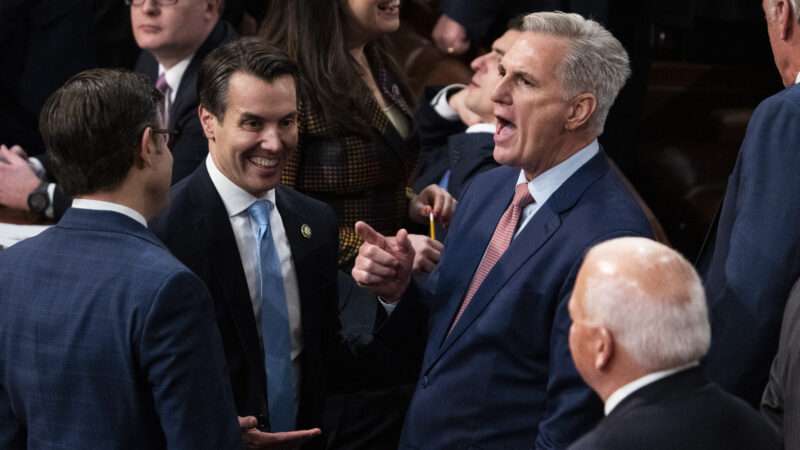
For the first time in 100 years, no one was elected speaker of the House on the first ballot when the new session of Congress opened on Tuesday—thanks to a breakaway faction of Republicans who denied Rep. Kevin McCarthy's (R–Calif.) bid to return to the top post in the House of Representatives.
McCarthy finished second to Rep. Hakeem Jeffries (D–N.Y.) in the first round of voting, but neither candidate reached the magic number of 218 needed to win a majority. Rep. Andy Biggs (R–Ariz.) received 10 votes on the first ballot, while Rep. Jim Jordan (R–Ohio) picked up six votes and three other lawmakers got one vote each. In all, 19 Republicans voted against McCarthy, who can afford to lose just four votes and maintain a majority of the closely divided chamber.
In a second round of balloting, Jeffries got 212 votes while McCarthy received 203, and Jordan consolidated the 19 Republican votes against McCarthy.
But why, you might be wondering, would a group of Republicans trigger this sort of chaos?
On Tuesday morning, Rep. Scott Perry (R–Penn.), one of the renegade Republicans, laid out the answer to that question in a lengthy statement posted to his Twitter account. Perry said that the group of Republicans opposed to McCarthy was seeking "firm commitments" from McCarthy on four "concrete policies" they wished to bring to a vote.
Those policies, according to Perry: A balanced budget, passage of the Fair Tax Act (which would replace the federal income, payroll, and estate taxes with a national sales tax), passage of a proposal crafted by Texas Republicans that aims to crack down on illegal immigration, and the imposition of term limits for members of Congress.
Additionally, Perry said that McCarthy was asked to support two changes to how the House operates. First, to require a two-thirds vote to approve earmarks, which would have to be voted on individually. Second, to allow amendments that would cut spending to be introduced on the House floor to any legislation.
As a set of proposals, it's a bit of a mixed bag—though the immigration element would be a massively expensive attempt to limit the free movement of people. It's also a bit crazy that lawmakers have to resort to once-in-a-century tactics just to get congressional leaders to consider balancing the budget.
But it is certainly not a radical or wildly irresponsible list of demands. More transparency and accountability on earmarks—something that hasn't really materialized despite the promises of those who pushed to end the earmark ban—would certainly be welcome. Floor amendments to legislation would be a step toward restoring the so-called "regular order" of moving legislation through Congress, another welcome and overdue reform.
In that same Tuesday morning statement, Perry said McCarthy effectively forfeited his chance to be speaker by refusing to go along with those requests. Later on Tuesday, Perry and his fellow breakaway Republicans followed through with that threat.
What happens now? It's unclear. There will be a third vote in the House, and perhaps many more. In 1855, it took 133 ballots before a stalemate for speaker of the House was broken.
"We are going to continue to vote until Kevin's the next speaker," Rep. Dave Joyce (R–Ohio), a McCarthy supporter, told CNN after the second round of balloting on Tuesday.
It might look chaotic and weird, but actually, this is just fine. It's democracy. For the moment, and maybe longer, think of the House of Representatives as functioning more like a multi-party democracy than the two-party duopoly that we're used to seeing.
In multiparty systems, two or more parties have to come together and form a coalition in order to achieve a governing majority. That requires some horse-trading and usually involves drawing up a semiformal document outlining what policies the coalition will work together to craft (and sometimes, equally importantly, which policies will be off-the-table).
For the purposes of the speaker election, Perry and his fellow renegade Republicans are operating like a minority party in a multiparty system: offering their support in exchange for getting to put a hand on the steering wheel of the future coalition government. If McCarthy doesn't want to make a deal with them, he might have to seek a coalition government with a centrist faction of Democrats. Failing that, Republicans might try to find someone else within their ranks who can get the requisite 218 votes from the chamber.
However it plays out, Tuesday's election for speaker of the House probably illustrates how Congress' next few years will look. Slim majorities in both chambers mean breakaway factions of Democrats (in the Senate) and Republicans (in the House) will be able to exert considerable influence over policy making. And it's at least a little bit refreshing to see some Republicans using that influence to talk about, well, actual policies.
The post Why Are Some Republicans Revolting Against Kevin McCarthy's Bid To Be Speaker of the House? appeared first on Reason.com.







